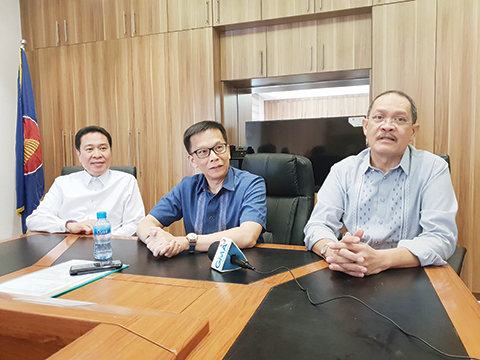 KUWAIT: Head of Philippines POEA Hans Cacdac (center) addresses reporters at the Philippines Embassy yesterday as the head of Philippines mission Nurdin Lomondot (right) and Philippine Labor Attache to Kuwait Rustico Dela Fuente look on.-Photo by Ben Garcia
KUWAIT: Head of Philippines POEA Hans Cacdac (center) addresses reporters at the Philippines Embassy yesterday as the head of Philippines mission Nurdin Lomondot (right) and Philippine Labor Attache to Kuwait Rustico Dela Fuente look on.-Photo by Ben Garcia
KUWAIT: After the memorandum of agreement (MoA) between the Philippines and Kuwait was signed last month, a group of recruitment agencies (both local and Philippine-based agencies) has come up with the special mobile apps to monitor the situation of the workers in Kuwait. This was revealed yesterday by the visiting Philippine Overseas Employment Administration (POEA) Administrator Hans Cacdac.
"The agencies have launched their own initiatives to monitor the workers through mobile apps. Allowing mobile phones and other communication gadgets is part of our President Duterte's request which was granted by Kuwait government in the MoA. This initiative is to check, monitor and safeguard our workers, besides our regular monitoring system being implemented by our office through POEA, OWWA and POLO all over the world," Cacdac explained.
There are four groups of NGO's (local and international recruitment agencies) who are providing free mobile applications that can be downloaded by the domestic helper once they are recruited and deployed in Kuwait. The groups include Advocates & Keepers Organization of OFW (AKO OFW-Middle East based-NGO), FILCRO, FIL-ASEAK and PHILAAK-CLAD. AKO OFW launched its mobile app 'Bantay OFW Mobile Application' in partnership with the Philippine Overseas Employment Administration (POEA) - coinciding with the culmination of the week-long celebration of this year's 23rd annual observance of 'Filipino Migrants' Day' last week.
"The mobile applications are set to monitor the situations of every OFW in Kuwait. This can be used to monitor their situations wherever they are. With those mobile apps, Household Service Workers (HSWs) can file complaints and their concerns. We are happy because we have motivated the local and foreign recruitment agencies to act immediately. The good thing about this is that those mobile apps are also linked with the offices both in Philippines and Kuwait," he stated.
The head of POEA is currently in Kuwait to check the situation and the implementation of the agreements signed last month. He also met with local government officials here last Saturday during an event organized by a Filipino-based local NGO. "The tough challenges we had few months back created several opportunities which are beneficial to both the domestic helpers and their employers," Cacdac said.
He said the shared responsibility of both employers and employees has been well-defined and elaborated in the MoA - although he admitted that the agreement is subject to several discussions. "The process continues. The upcoming Joint-Committee Meeting which is scheduled next month in Kuwait was set to clarify some points and put them in proper perspective. The good thing is that even as we talk, the MoA is now being implemented," he said.
"Right now, the employers have handed the workers' passports to the Philippine Embassy. Some basic rights such as communication gadgets have been given to them also - including weekly holidays, official working hours, good meals among others. We also see strict enforcement of Kuwaiti domestic laws which are aimed at protecting the domestic helpers. Yesterday, we met with the officials of Public Authority for Manpower at the Ministry of Labor," Cacdac said.
With regards to the cost of hiring Filipino domestic helpers, Philippine Labor Attache to Kuwait Rustico Dela Fuente cited the recent decision by Kuwaiti authority to set the price ceiling from over a KD 1000 to just about KD 900. "During our meetings last time, we discussed the issue of lowering the cost of hiring domestic workers. As we mentioned before, we are not the right people to discuss this. It has to be addressed by the local and foreign recruitment agencies. I heard the KD 900 price ceiling (limit) is set by Al-Durrah Company. This move is actually one of many desires of our government. Because of high recruitment charges, some employers mistreat the workers. It was indeed excessive and we raised the issue during the initial negotiations with Kuwaiti authorities," he added.
The Al-Durra Company was established in response to calls that privately-run agencies were charging huge amount of money. The current charges for recruiting helpers at private agencies stand at approximately KD 1,200 to KD 1,600. Al-Durra was established in accordance with Law No. 69/2015 as a closed Kuwaiti shareholding company. Al-Durra is owned by various government agencies such as the Union of Consumer Cooperative Societies (60%), Public Institution for Social Security (10%), Kuwait Airways (10%), Public Authority for Minors' Affairs (10%) and Kuwait Investment Authority (10%).
Al-Durra's mission is to recruit and train domestic helpers to offer an alternative to the unreasonable fees and 'monopolistic practices' of privately owned recruitment companies. Another stated objective is to operate with transparency to improve Kuwait's image and reputation internationally with regards to human rights.
By Ben Garcia




